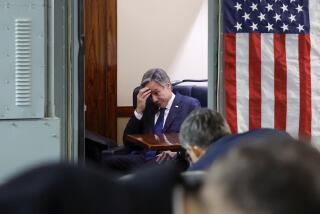U.S. Condemns Use of Force to Preserve Unity
- Share via
WASHINGTON — The Bush Administration bluntly warned Yugoslavia’s central government Tuesday that the United States opposes the use of military force, even to prevent the disintegration of the 73-year-old Balkan federation.
Ambassador Dzevad Mujezinovic was summoned to the State Department to be told that although the U.S. government supports Yugoslav unity and opposes the unilateral secession of Slovenia and Croatia, it opposes even more strongly the use of military power to force the rebellious republics to return to the federation.
“We do not support the use of force to preserve Yugoslavia’s unity,” State Department spokeswoman Margaret Tutwiler said in recounting the meeting between Mujezinovic and Deputy Secretary of State Lawrence S. Eagleburger.
Tutwiler said the Administration opposes any change in Yugoslavia’s “external or internal borders” without the agreement of all factions in the multi-ethnic country. But she said Washington will accept any outcome that is acceptable to all factions, even the total independence of some or all of the federation’s six member republics.
Meanwhile, in Vienna, the newly created Conflict Prevention Center of the 35-nation Conference on Security and Cooperation in Europe called for an immediate cease-fire and a return of all troops to their barracks in strife-torn Slovenia. An earlier cease-fire broke down Tuesday.
The White House said that President Bush wrote to Yugoslav President Stipe Mesic urging resumption of dialogue between the central government and its constituent republics. Those talks collapsed before Slovenia and Croatia declared their independence last week.
White House Press Secretary Marlin Fitzwater said that Bush “expressed the hope that all parties in Yugoslavia would seek a dialogue toward a new and democratic basis for Yugoslavia’s future in which the aspirations of all the Yugoslav peoples can be realized.”
Bush also urged Mesic to “ensure that civilian control over the military is re-established and peace restored,” Fitzwater said. That wording seems to imply that the United States has concluded that the Yugoslav army is operating on its own without regard to government policy. However, a senior State Department official said the Administration does not know whether the army is out of control.
For the United States and Yugoslavia’s European neighbors, the Balkan crisis is a dilemma, forcing them to choose between supporting the dismemberment of a nation and backing the military suppression of a democratically expressed desire for self-determination. Not surprisingly, much of the reaction has reflected the same ambivalence.
A British Foreign Office official in London declared: “How can we push for self-determination for the Baltic states if we don’t recognize that democratic republics like Slovenia and Croatia do not want to be ruled by a Communist central government?”
However, no nation has recognized the independence of Slovenia or Croatia.
“If at the end of the day, the Serbs and the Croats and the Slovenes have decided they’re going to have a civil war,” British Foreign Secretary Douglas Hurd said, “it’s not something at the end of the day we can prevent.”
Nevertheless, the Conference on Security and Cooperation in Europe turned to the conflict as the first test of its new crisis-resolution machinery.
In Vienna, the Conflict Prevention Center--created at a European summit meeting last fall but never before used--issued a unanimous statement pointing to “the importance of an immediate and complete cessation of hostilities by all parties involved; and of a prompt implementation of the commitment . . . to an immediate return to their barracks by all the relevant units of the Yugoslav army as well as the territorial defense forces of Slovenia.”
Today in Prague, CSCE ambassadors plan an emergency meeting to discuss ways of ending the crisis. The CSCE emergency procedure is even newer than the Conflict Prevention Center, having been created at a foreign ministers meeting last month in Berlin.
The CSCE, which includes the United States, Canada and every nation in Europe--including Yugoslavia--can act only by unanimous agreement. The organization hopes to serve as a broker between the central government in Belgrade and the breakaway republics, even though the central government is a member of CSCE while Slovenia and Croatia are not.
Meanwhile, the 12-nation European Community announced that it is sending a delegation of diplomats from the Netherlands, Portugal, Luxembourg and Italy to Yugoslavia to attempt to mediate in the crisis. The group is scheduled to arrive in Belgrade today and to go from there to Ljubljana, the Slovenian capital. It also may visit Croatia.
The EC renewed its threat to end all economic aid to Yugoslavia and its constituent republics until the crisis can be settled.
The European announcement called for the dispatch of international military observers--drawn either from the EC or the larger CSCE--to verify any cease-fire that the central government and the rebellious republics might agree on. The United States endorsed that approach.
Despite the flurry of diplomatic activity, however, no one seemed to know how to resolve the crisis if the Yugoslav factions do not agree to resume peace talks.
The State Department’s Tutwiler said the Administration opposes the Slovenian and Croatian declarations of independence “because we feared they would contribute to violence, and indeed, as we all are witnessing, they have.”
“Dialogue, not use of force, must shape Yugoslavia’s future,” Tutwiler said. “A cooling-off period is needed to launch a dialogue that responds to national aspirations of the people and creates a new basis for relations among the peoples and republics of Yugoslavia.
“We will respect any framework on which the people of Yugoslavia peacefully and democratically decide,” she added. “We firmly believe that Yugoslavia’s external or internal borders should not be changed unless by peaceful consensual means.”
Times staff writer William Tuohy, in London, contributed to this report.
More to Read
Sign up for Essential California
The most important California stories and recommendations in your inbox every morning.
You may occasionally receive promotional content from the Los Angeles Times.










